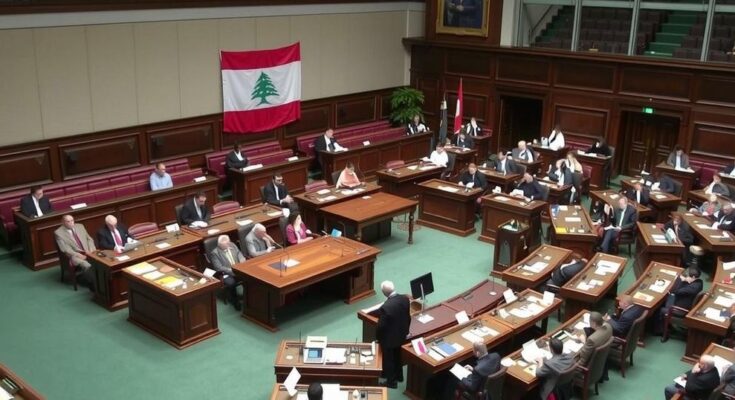Lebanon’s parliament is poised to elect a new president after a two-year vacancy, with army commander Joseph Aoun as the leading candidate. Previous attempts have stalled, but recent endorsements may clear his path. The election is crucial for establishing a permanent government amidst ongoing economic struggles and reconstruction needs.
Lebanon’s parliament is set to hold another crucial session to elect a president, marking a significant endeavor after a prolonged two-year vacancy. This latest attempt comes as a response to the stalled political climate following the departure of former President Michel Aoun, whose term concluded in October 2022. While previous efforts to identify a successor have yielded no results, there are optimistic indications that this vote could successfully inaugurate a new leader for the fractious nation.
The leading candidate for the presidency is Joseph Aoun, the commander of the Lebanese army, who is perceived as the favored choice by both the United States and Saudi Arabia. Their backing will be vital for Lebanon’s recovery, especially following its challenging ordeal against Israel and Hezbollah over the past 14 months. The political landscape shifted recently when Suleiman Frangieh, a previously considered contender with strong affiliations to Syria, withdrew and expressed support for Aoun’s candidacy, further consolidating his position.
Historically, Lebanon’s political system suffers from inherent sectarian fragmentation that often results in prolonged stalemates. This has been evident during past presidential crises, including a significant hiatus from 2014 to 2016, which only concluded with Michel Aoun’s election. Currently, Joseph Aoun’s presidency is complicated by constitutional provisions that typically hinder sitting military commanders from assuming the presidency. As a result, he would require a two-thirds majority even if the vote were to enter subsequent rounds.
Moreover, other potential candidates remain in the race, including Jihad Azour, a former finance minister now serving at the International Monetary Fund, and Elias al-Baysari, the acting head of Lebanon’s General Security agency. The new president’s election is critical, as it will enable the formation of a permanent government to address the crippling issues Lebanon faces, including reconstruction efforts and the ongoing economic crisis, which has severely impacted the population and the state’s infrastructure.
Lebanon has been mired in a political impasse for over two years, primarily due to the absence of a president following Michel Aoun’s departure. This situation has hindered the country’s ability to appoint a permanent prime minister or cabinet, leaving a caretaker government with limited authority. Amidst this power vacuum, Lebanon grapples with multiple crises, including economic deterioration, insufficient public services, and the aftermath of conflicts involving Hezbollah and Israel. The congressional approach to electing a president is beset with procedural complexities inherent in Lebanon’s sectarian power-sharing arrangements, often leading to drawn-out election processes and resulting deadlocks.
The upcoming presidential vote in Lebanon represents a pivotal moment for the nation as it seeks to resolve a protracted leadership void. Joseph Aoun’s candidacy, bolstered by significant international support, presents a potential pathway for stabilization and recovery. However, the constitutional challenges he faces, alongside the historical context of political fragmentation in Lebanon, underscore the complexities involved in this electoral process. Ultimately, the necessity for a functioning government to address the myriad crises confronting Lebanon is more urgent than ever.
Original Source: www.hindustantimes.com




